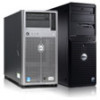Dell PowerEdge T610 Hardware Owner's Manual - Page 166
Troubleshooting an Internal USB Memory Key
 |
View all Dell PowerEdge T610 manuals
Add to My Manuals
Save this manual to your list of manuals |
Page 166 highlights
11 Place the system upright and on its feet on a flat and stable surface, reconnect the system to the electrical outlet, turn on the system and attached peripherals, and check if the SD card is functioning. If the problem is not resolved, see "Getting Help." Troubleshooting an Internal USB Memory Key CAUTION: Many repairs may only be done by a certified service technician. You should only perform troubleshooting and simple repairs as authorized in your product documentation, or as directed by the online or telephone service and support team. Damage due to servicing that is not authorized by Dell is not covered by your warranty. Read and follow the safety instructions that came with the product. 1 Enter the System Setup program and ensure that the internal USB port is enabled. See "Integrated Devices Screen." 2 Turn off the system, including any attached peripherals, and disconnect the system from the electrical outlet. 3 Open the system. See "Opening the System." 4 Locate the internal USB key and reseat it. See "NIC Hardware Key." 5 Close the system. See "Closing the System." 6 Place the system upright and on its feet on a flat and stable surface, reconnect the system to the electrical outlet, turn on the system and attached peripherals, and check if the internal USB memory key is functioning. 7 If the problem is not resolved, repeat step 2 and step 3. 8 Insert a different USB key that you know works properly. 9 Close the system. See "Closing the System." 10 Place the system upright and on its feet on a flat and stable surface, reconnect the system to the electrical outlet, turn on the system and attached peripherals, and check if the internal USB key is functioning. If the problem is not resolved, see "Getting Help." 166 Troubleshooting Your System















